Ministry of Power
Solar Panels to have Star Label indicating Quality and Energy Efficiency, Programme to be voluntary for first two years
“Star Labelling of Solar Panels to help citizens make informed decisions”: Union Minister for Power and New & Renewable Energy R. K. Singh
“Star enabling of solar panels will reduce carbon dioxide emissions by 30 million tonnes per annum by 2030”
Government to insist upon 100% Made in India Solar panels after a few years, says Union Minister for Power and New & Renewable Energy R. K. Singh
Posted On:
20 OCT 2023 5:37PM by PIB Delhi
The Government has come out with a Standards & Labelling Programme for solar panels. The programme, launched in New Delhi today, October 20, 2023, by the Union Minister for Power and New & Renewable Energy Shri R. K. Singh, will make it easier for citizens to make an informed and judicious decision while purchasing and deploying solar photovoltaic modules, known commonly as solar panels. The star labelling scheme prepared by the Bureau of Energy Efficiency (BEE) for PV modules is from January 1, 2024 till December 31, 2025. For this period, there shall be no labelling fee as well.
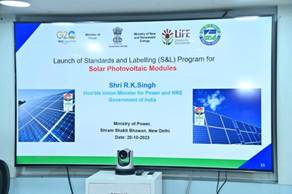
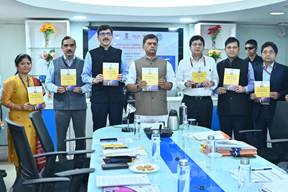
On the one hand, the formulation of performance standards will enable customers to be better aware of the cost and energy savings from using solar panels. At the same time, this also contributes to the government’s larger goal of enhancing the share of renewable energy and reducing emission intensity of GDP by 45% by 2030.
“Till now, consumer had no option but to go by what installer says; with Star Labelling Programme, citizen can know which brand of solar panel is more or less efficient”
The Minister said that the Standards & Labelling Programme is in public interest, and explained how precisely the programme will empower the common man and woman who wants to install a solar panel. “While the government is promoting the solar rooftop programme, the common citizen has absolutely no idea as to which solar panel is more efficient or less efficient. At present, he or she is at the mercy of the vendor, the installer. The installer can say anything and the consumer had no way to check it. Now, the person who wants to get a rooftop installed can see for himself or herself which brand of solar module is more efficient, which is less efficient.”
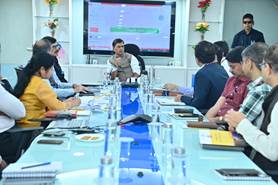
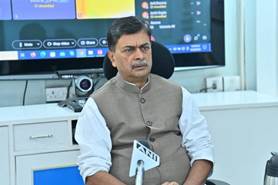
“Star enabling of solar panels will reduce carbon dioxide emissions by 30 million tonnes per annum by 2030”
Shri Singh explained that besides public interest, the other motivation for the programme is the government’s focus on energy transition. “Our programme for Star Labelling is a world leader. It has resulted in emissions reduction of almost 58 million tonnes of CO2 per annum, Overall, just 3 – 4 programmes of BEE have resulted in a reduction of carbon dioxide emission of almost 300 million tonnes per annum. The assessment is that Star enabling of solar panels will reduce carbon dioxide emissions by 30 million tonnes per annum by 2030. This is necessary for the survival of the planet and of human beings.”
Come and get yourself empanelled in Star Labelling Programme: Power and NRE Minister exhorts all manufacturers of solar panels
The Minister urged the industry to get themselves registered under the star labelling programme. Shri Singh said that the programme is voluntary in the initial two years and that it will be made compulsory after that. “Today, we have empowered the consumers to choose better. The programme is voluntary for initial two years; after one year, we will review and if we find that the industry is not coming forward for labelling, then we will make it compulsory, as it is a matter of public interest. I exhort all module manufacturers to get themselves empanelled.”
“After a few years, our panels will be 100% Made in India and of the Best Quality”
The Union Minister said that the government will work towards 100% Made in India Solar PV modules of the best quality. “We will bring in a policy after 2 years, under which even PV Cells should be manufactured in India and not imported from elsewhere. After a further two years, we will insist on wafer to be made in India so that our solar panels will be 100% Made in India and high-quality solar panels, where first cells and later wafers too shall be Made in India. India is not going to be satisfied with second best; we want nothing but the best. So, lesser efficient panels will be removed from the ALMM (Approved List of Models and Manufacturers) over time; outdated models will not be endorsed by the government. ”
“Star Labelling Programme will provide immense guidance to the Ordinary Citizen”
The Union Power Secretary Shri Pankaj Agarwal explained that the Star Labelling Programme will enable the retail consumer to make the right choice, by enabling him or her to better differentiate among different models of solar panels which at present look alike. “The Star Labelling programme will bring in product differentiation, to a market where the products are fully commoditized as of now. At present, the citizen has no clue which product is good. The programme will help the citizen to make the right choices.”
“Ordinary consumers have to make major contribution in growth of solar rooftops”
The Secretary pointed out that the government is looking to expand adoption of solar rooftops. “During the G20 deliberations under India’s Presidency, the G20 Leaders came up with the mandate of doubling our energy efficiency by the year 2030. India has launched its Standards & Labelling Programme and has become a world leader in this area, enabling us to reduce our carbon footprint by around 58 million tonnes per annum. We are also a global leader in implementing grid-scale solar energy. We are also looking at expanding our footprint on solar rooftops, in which the ordinary citizen – the retail consumer - will have to play a major role.”
“Growth of Solar Panels has been exponential, another 200 GW of solar panels to be added between now and 2030”
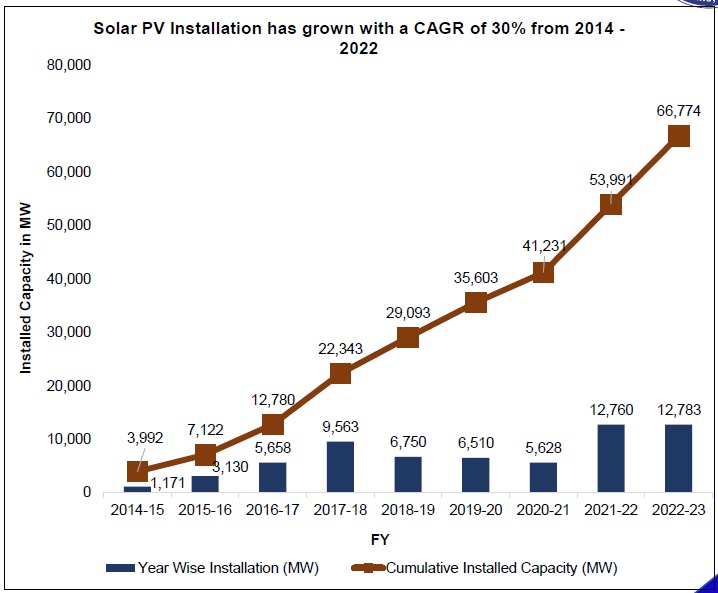
Director General, BEE, Shri Abhay Bakre informed that the growth of Solar PV modules has been and will be enormous. “From now till the year 2030, we are expecting to add at least another 200 GW of solar panels, both from ground-mounted and solar rooftops, since we have an ambitious plan for addressing climate change.”
The Programme is based on effective efficiency. Director General, BEE, Shri Abhay Bakre said that it is expected that the Solar PV module efficiency will enhance by 2% over its existing levels. Owing to performance improvement, the electricity generation is expected to increase by 33GWh/year and this will offset ~27,000 tons of CO2 emission per annum.
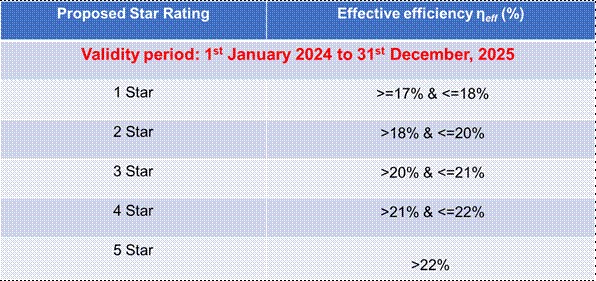
Speaking about the impact, he said that on a typical 10 square-metre roof area, a progression from 1-Star to 2-Star solar panel will result in additional electricity generation of around 12%, while the increase as compared to 1-Star solar panel can be as high as 29% - 35% for 4-Star and 5-Star panels.
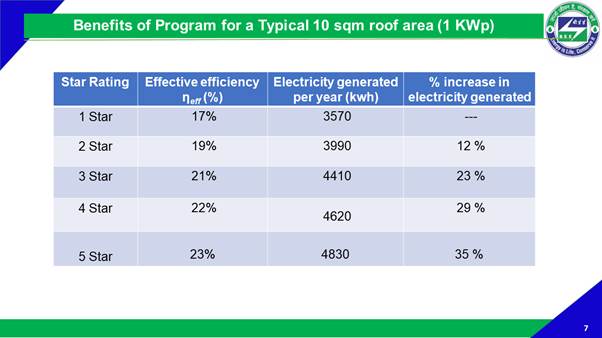
As of now, 15 appliances are in mandatory regime, i.e., the appliances cannot be sold in the market without the label; and 19 appliances are in voluntary regime, where the market is in development stage.
A presentation on the Programme can be found here.
***
PIB DELHI | Alok Mishra / Dheep Joy Mampilly
(Release ID: 1969458)
Visitor Counter : 4601